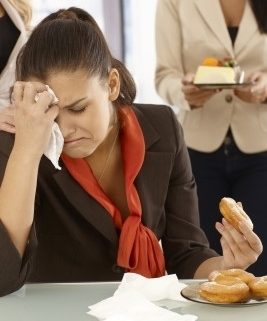Food Shaming and How to Break Out of the Cycle
 Are you suffering from food shame? Have you recently encountered someone telling you not to eat something because it is fattening? Do you get looks from people if you eat a cookie? Or maybe you are the one engaging in these behaviors and judging others based on what they eat. The concept of classifying food as “good” or “bad” and then judging others based on where your perception fits is called food shaming. This can negatively impact your health.
Are you suffering from food shame? Have you recently encountered someone telling you not to eat something because it is fattening? Do you get looks from people if you eat a cookie? Or maybe you are the one engaging in these behaviors and judging others based on what they eat. The concept of classifying food as “good” or “bad” and then judging others based on where your perception fits is called food shaming. This can negatively impact your health.
Does this scenario sound familiar to you? You are in the company of a particular family member who once again makes a comment or gives you a look when you reach for a food that they consider “off limits”. You become extremely frustrated to be on the receiving end of this judgment. As a result, not only do you end up depriving yourself of the food you really want, but you also find yourself experiencing an emotion such as anger. You become angry with this person for making a comment and because then you end up not eating that food to avoid the judgment.
It becomes a vicious cycle in which you may also find yourself engaging in this behavior, such as when you are at the grocery store and see another shopper with a cart full of unhealthy, fat and sugar laden food. You automatically make the assumption that they must be in poor health.
How did this happen? How has this become a socially acceptable norm?
It boils down to influences and messages that you receive throughout life. These messages come early in life from parents and build throughout your years from the media, friends and even healthcare professionals.
What you may not realize is how detrimental this is to your health and mental well-being. These kinds of beliefs and thought processes go against your natural feeding instincts. You are born with natural hunger and satiety cues. Allowing food shaming to influence you effectively violates these inborn cues. Instead of indulging in a craving when you are actually hungry for it, you are doing yourself a great disservice and instead create feelings of deprivation and anger. Feelings of deprivation and anger can then backfire and cause an overeating episode in an effort to satisfy the deprivation and quell the anger. Overeating episodes such as this often happen when you are not actually hungry. This then results in feeling bloated and lethargic as well as powerless over how much you just consumed. So the anger and deprivation finally result in powerlessness and low self-efficacy from the loss of control.
How can you best defend yourself from food shaming? You need to embrace intuitive eating to tune into your physiological cues to eating, avoid emotional eating, develop a healthy relationship or make peace with food, and respect your body. Intuitive eating brings you back to your roots and re-engages you with your innate drive to eat.
Now it’s your turn to take action: What will you do this week to combat food shaming?


Leave a Reply
Want to join the discussion?Feel free to contribute!